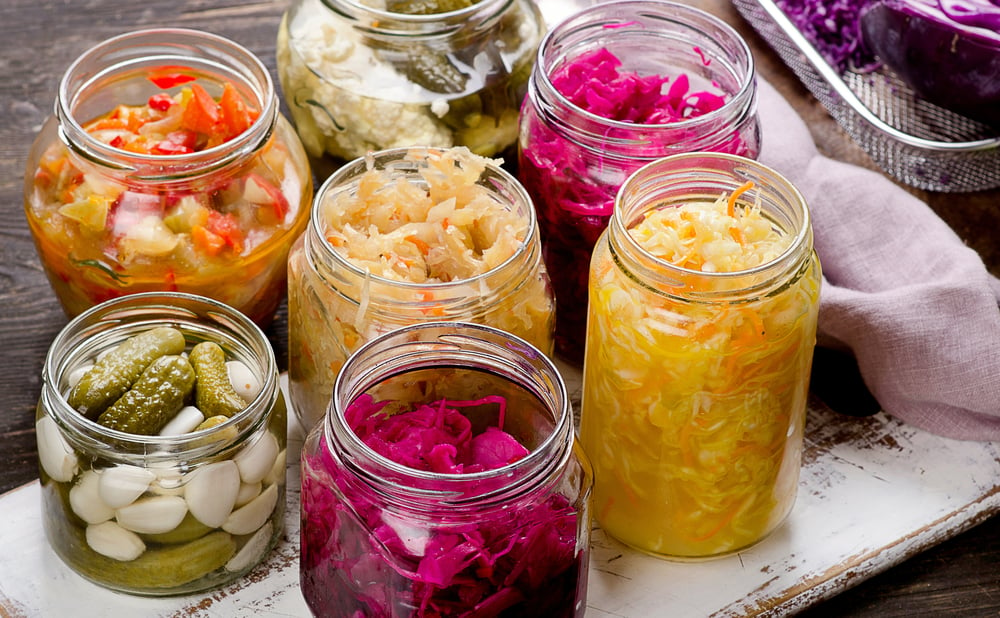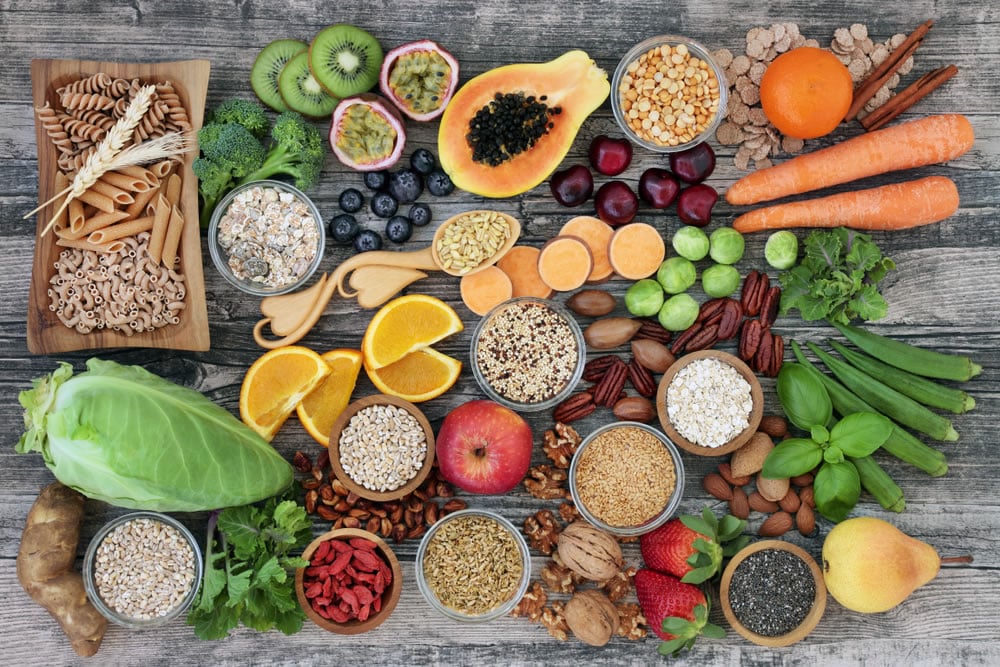
10 Ways to Improve Your Gut Health
Your digestive system consists of a complex network of organs that are designed to break down food, absorb nutrients, and eliminate waste. This intricate system measures about 30 feet on average and starts at the mouth and ends at the anus. Unfortunately, the combination of junk foods, alcohol, stress, and other modern environmental factors can contribute to an unhealthy gut, which can result in digestive problems, mood disorders, and general ill health. Let’s take a look at ten ways you can improve your gut health.
Feed your gut bacteria with a diverse variety of foods.
Your body is home to trillions of bacteria, many of which live in your stomach and intestines. Many of these bacteria play an important role in the break down of foods, absorption of nutrients, and the general health of your digestive system.
Your intestines contain hundreds of different species of bacteria, each requiring its own types of vitamins and nutrients to grow and thrive. Generally, the more diverse your bacteria (microbiome), the more health benefits they may contribute. Eating a diverse diet ensures that each of the hundreds of different species gets exactly what they need.
Unfortunately, the modern Western diet is highly limited, consisting primarily of fats and sugars. Estimates suggest that 75 percent of the Western diet is produced from just five animal species and 12 plant species, which is unfortunate considering the huge range of foods in the world. By comparison, other studies have found that peoples from African and South American regions have a much diverse gut microbiota.
Improve Your Gut Health By Eating Plenty of Fruits and Vegetables.
The good news is that eating diversely is as easy as visiting your local farmers market or spending more time in the produce section of your grocery store. Fruits and vegetables are the key sources for a huge range of vitamins, minerals, and nutrients that can help your gut, its microbiota, and all your other organs and organ systems.
One study found that increasing the number of fruits and vegetables in your diet can prevent the growth of negative health microbes while improving the function and diversity of your gut bacteria.
Consider colostrum.
Bovine colostrum is a milk-like fluid that comes from the breasts of cows in the first few days after giving birth. It is rich in a variety of vitamins, minerals, nutrients, and immunoglobulins that help support gut health and promote a healthy immune response.
Numerous studies show that colostrum can help to promote good gut health by reducing gut permeability. Bovine colostrum can help maintain the tight junctions that comprise the delicate lining of the gut and provide additional health benefits. Some of the key components in bovine colostrum include:
- Methylsulfonylmethane (MSM) – MSM is a micronutrient.
- Proline-rich polypeptides (PRPs) – Proline-rich polypeptides help promote a healthy immune system.
- Lactoferrin – Lactoferrin is a beneficial protein that contributes to promoting immune health.
- Growth factors – Colostrum is rich in growth factors, which support a wide variety of functions within the gut.
Eating More Fiber is a Great Way to Improve Your Gut Health
Alternately known as bulk or roughage, dietary fiber is a plant-based nutrient that is actually a type of carbohydrate. Unlike other carbs, fiber cannot be broken down into smaller sugar molecules and instead passes through your digestive system relatively intact. Fiber plays a huge role in nearly all aspects of your health, from weight management to heart health.
It’s maybe no surprise then that fiber can contribute to a healthier gut. Studies suggest that fiber can help to feed beneficial gut bacteria and produce bacteria that can help to secure your gut.
Fiber is mainly found in whole grains, beans, legumes, fruits, and vegetables. It is particularly high in the skins of fruits and vegetables. Some high fiber foods include:
- Lentils (about 16 grams of fiber per cup)
- Berries (about 7 grams of fiber per cup)
- Split peas (about 16.3 grams of fiber per cup)
- Apples (one apple has about 4.4 grams of fiber)
- Artichokes (one medium artichoke has over 10 grams of fiber)
- Lima beans (about 13.2 grams of fiber per cup)
Incorporate probiotics.
Probiotics are live yeasts or bacteria found in a variety of fermented foods and supplements. There are several types of probiotic bacteria and numerous strains within each type, but the two most common groups are Lactobacillus and Bifidobacterium. When ingested, these bacteria take residence in your gut and contribute to your growing microbiota while rebalancing the microflora within your intestines.
Studies suggest that probiotics can help to promote better digestive health and immunity, among other benefits.

Probiotics can generally be found in fermented foods, including:
- Yogurt
- Kimchi
- Sauerkraut
- Kombucha
- Tempeh
- Kefir
- Dill Pickles
- Olives Cured in Brine
Add prebiotics.
Prebiotics do not contain helpful bacteria in and of themselves. Instead, they comprise foods that feed beneficial bacteria in your gut, promoting the growth of your gut microbiota. Prebiotics generally consist of foods high in fiber. When you eat a prebiotic food, it passes through your upper gastrointestinal tract relatively intact. Once they pass through the small intestine and reach the large intestine, prebiotic foods are eaten by the gut microflora, essentially resulting in the process of fermentation.
When combined with probiotics, prebiotic compounds can help to bring about positive changes in the activity and composition of the gut and gastrointestinal system. Prebiotics can help to maintain a balance of bacteria while building a greater diversity of beneficial gut bacteria, especially with Lactobacilli and Bifidobacterium.
Some good prebiotic foods include:
- Acacia gum
- Raw leeks
- Under-ripe bananas
- Raw garlic
- Onions (both raw and cooked)
- Raw asparagus
- Raw jicama

Improve Your Gut Health by Eating Polyphenol-rich Foods.
Polyphenols are a type of plant compound that includes flavonoids, stilbenes, and phenolic acids. Similar to fiber and prebiotics, polyphenols can be difficult for your body to digest or properly absorb, which often means they pass right into your colon to feed your hungry microflora. Polyphenols can be found in:
- Grape skins
- Onionspre
- Red wine
- Almonds
- Cocoa and dark chocolate
Studies show that polyphenols from cocoa and red wine can help to increase the number of Lactobacilli and Bifidobacterium and reduce the amount of Clostridia (a potentially bad bacteria) in your gut. These changes have also been found to decrease triglycerides (or fats) levels. Of course, be aware of the sugar content in your chocolate and the alcohol content in your red wine, both of which may counteract the benefits of the polyphenols.
Carefully consider antibiotic use.
Antibiotics are truly a miracle that can help to neutralize infections and treat numerous diseases and disorders that may otherwise be fatal. However, the overuse of antibiotics can contribute to an unhealthy gut. Antibiotics do not always discern between good and bad bacteria, meaning they may end up eliminating many of the healthy bacteria in your gut and limiting the diversity of your microbiota. This can result in dysbiosis, or microbial imbalance, which can lead to a variety of gut-related issues. Overuse can also result in antibiotic-resistant bacteria. These “superbugs” can be harder to treat, requiring even harsher antibiotic use down the line.
While you should by no means completely eliminate antibiotics from your healthcare, reconsider when you should ask for antibiotics with your doctor. Don’t take leftover antibiotics and remember that antibiotics are designed specifically to kill bacteria.
Avoid foods that harm your gut bacteria.
Some foods can hurt or reduce the growth of gut bacteria, including:
- Red meat
- Fried and processed foods
- High-fat dairy products
- Advanced glycation end products (AGEs)
AGEs comprise proteins and fats that have been exposed to high heat along with sweets and sugar molecules. All of these foods have been found to increase the growth of bad bacteria.
Get plenty of exercise.
Along with watching what you put into your body, it’s always a good idea to consider physical activity and exercise. Studies on both mice and humans found that exercise (independent of diet) can modulate the composition of gut microbiota, increasing the synthesis of short-chain fatty acids, compounds known to promote overall gut health. Exercise also helped to increase the number and diversity of gut bacteria.
This article was brought to you by Sovereign Laboratories, a world leader in the development of liposomal delivery to maximize the bioavailability of our dietary supplements.


